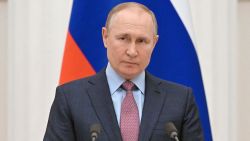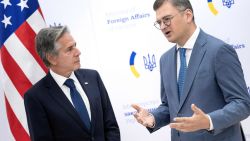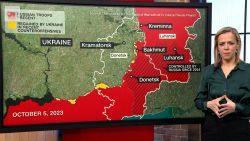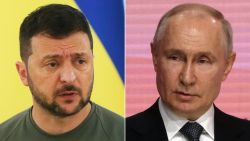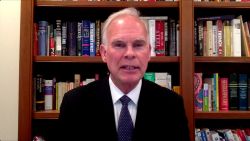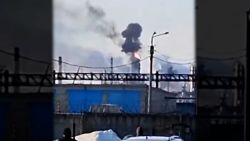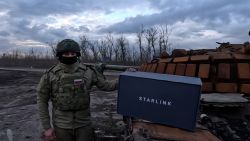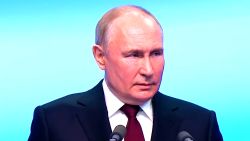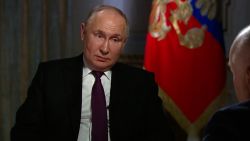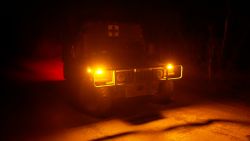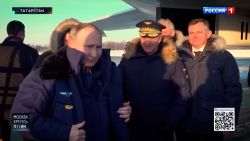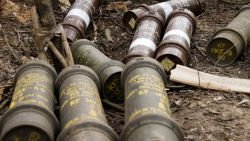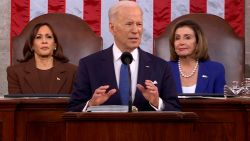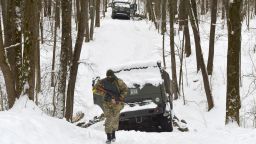I leave Moscow angry and sad.
It feels like a passage out of darkness to light, but left behind are friends trapped in one man’s tunnel vision.
Russian President Vladimir Putin isn’t just destroying Ukraine, but two nations, condemning Russians to an isolation they didn’t necessarily choose.
Over the past couple of months while I’ve been reporting from Moscow, I’ve met many people who have been horrified, shocked and numbed by Putin’s wanton aggression. Some of them believed him when he said he wouldn’t invade Ukraine. Some even knew players in the Kremlin inner circle and thought they understood the President’s red lines, but now that trust is blown and they fear he has no limits at all.
What makes Putin’s actions all the more galling is how he executed his plot in plain sight. Distracting with one hand, transfixing attention on diplomacy, even while insisting falsely that his massed troops were carrying out exercises on Ukraine’s borders.
Ordinary Muscovites didn’t even flinch as he perpetrated this betrayal by marching the nation to war on a cocktail of carefully stewed grievances.
Putin spent years building a false narrative along with his empire. The wishes that he was denied, such as NATO withdrawing to 1997 lines or barring Ukraine from membership, was the West’s fault, he claimed. But if Putin did believe Russia’s security was threatened, and that the modern western world was pitted against him, the truth was that he never adjusted to the changing dynamics of the 21st century.
A taste of freedom
My first visit to Moscow came in 1990 not long after the Iron Curtain began to fall. I’d seen the Berlin Wall come down in the previous year, heralding the reunification of East and West Germany, and was in Bucharest shortly afterwards when Romanian President Nicolae Ceau?escu was deposed.
Back then a packet of American Marlboro cigarettes waved at the roadside outside the CNN bureau on the imposing Kutuzovsky Prospekt got you a taxi ride, another pack paid for a haircut. Moscow was finally connecting to the world; our bureau had phone lines that I helped install as a young engineer that were direct satellite extensions to our Atlanta switchboard.

During those bright, long summer days, the USSR’s last leader Mikhail Gorbachev gave our network permission to erect a stage on Red Square in the center of the Russian capital. We were the first western media to broadcast live from the fabled military parade ground, yards from Lenin’s tomb in the shadow of the Kremlin’s foreboding brick walls, and were witness to the Soviet Union’s last party Congress.
The world was changing, the Cold War thawing, new horizons beckoning, and a generation of Russians was about to taste the freedoms they craved.
Seven years later I helped Gorbachev – who had been ousted from power not long after our Red Square debut, ousted following a coup, and succeeded by the alcoholic Boris Yeltsin – climb a rickety iron ladder to another live stage at the top of a swanky new western chain hotel where we were covering the elections that year. Democracy seemed at hand.
Nights in Moscow in ’97 were wild, with revelers dancing in – and often on – the bars. The country was on a ride, with vast fortunes to be made, oligarchs newly minted as gamekeepers turned poachers, KGB apparatchiks became mafia dons acquiring state assets, and Putin was threading his way to power.
In the waning minutes of the 20th century Yeltsin plucked Putin from among the money-corrupted milieu in the Kremlin to replace him as Russian President – and in return, Yeltsin, who had battled corruption allegations, got immunity from prosecution.
For a while after Putin rose to power at the turn of the millennium, there was a glimmer of the modernizer about Russia’s new leader, but that reputation didn’t last long. With unbridled passion he soon tapped into nationalism, embraced imperial nostalgia and the conservatism of the Russian Orthodox Church stoked Soviet-era suspicions of westerners and stifled dissent. None of this was done to make Russia a better place in which to live; it just made easier for him to rule.
He quickly shed all vestiges of the liberal skin he readily admits was never his: In his mind, the breakup of the Soviet Union had been a national disaster and one that he intended to right. And though he came to power pledging to eradicate corruption, in reality it only spiraled under his rule.
This year, while I have been in Moscow covering the buildup and outbreak of war in neighboring Ukraine, it became painfully clear to me that, just as the Nazis did in Germany during the 1930s and 40s, Putin has had laws made to his order. And like many a strongman before him, the Russian President is ruthlessly unleashing the compliant and complicit state apparatus that he himself built, to obediently enforce them.
In short, his every wish is readily executed.
A burning rage
In recent days Moscow’s clogged arteries have pulsed to flashing blue lights of police vehicles of every size and shape, from lowly traffic cops to lumbering trucks loaded with recently arrested protesters, their strident sirens insisting other traffic yield to them as they blast their way through.
As more Ukrainian cities crumbled under Russian bombardment, at home riot-ready cops enforced Putin’s Orwellian writ to crush any sympathy for their neighbors. Across Russia, more than 1,000 protesters a day were arrested during the first week of the war.
We watched as young and old alike, men and women were body-slammed, arms bent excruciatingly behind backs, faces slammed on floors, legs kicked apart by a well-trained, well-paid, menacing human machine. A branch of the state has been grown for this purpose, and it is now being wielded unflinchingly.

There is a burning rage when you see what’s happening in both Ukraine and Russia, knowing innocents will suffer, and you find your voice strangled and struggling to shout against the obvious concocted insanity of Putin’s justification for the war.
Each morally repugnant outrageous act witnessed is another coal to that internal fire. Each freezing evening watching protesters arrested for daring to question Putin’s war, daring to express their own views, turns chill to raging flame.
This also, like the war in Ukraine, is the crucible of autocracy’s challenge to democracy, where freedom meets brute force and cynical laws.
Putin has shaped the Russian state entirely in his image, a move that will not be easily righted. The majority are cowed, the complicit in too deep to reverse their actions, his sanctioned cronies warned to swallow their anger and take the losses for the team like true patriots.
On side streets away from the riot police, anti-war protesters choked back their feelings as they told us their agonies, of “loving Russia,” “hating Putin” and torn about wanting to be “anywhere” but here.
Putin has sown a bitter harvest, with international condemnation reinforcing his tropes, strengthening his hand by silencing the unwilling. Independent media, on life support since Russian security services allegedly poisoned opposition leader Alexey Navalny almost two years ago, is suddenly suffocating under harsh new media laws gagging any criticism, punishable with up to 15 years in prison.
Less than a month before Putin’s invasion, I met anchor Ekaterina Kotrikadze of TV Rain, one of the last independent stations. Her words then were prophetic: “You can never be sure that tomorrow your TV station will still be alive and on air and broadcasting.”
Days after the war started, Putin had it shut down. Kotrikadze, an eloquent voice of Russia’s dispossessed bright hopes, is now on the run, outside of Russia with her editor husband and their smart young children. The country is darker without them.

Putin’s so called “Special Military Operation” in Ukraine looks like all his previous wars: Syria, Chechnya and Georgia. Lives crushed, cities blindly smashed by long-range rockets and artillery shells to sate his vision.
It’s impossible to know where his rage ends, in Ukraine or beyond. Putin insists Ukraine is not a real country, and in fact part of Russia, but will he stop even if he conquers it? Or is NATO, as he claims, the real problem, suggesting he could stop at the Western military alliance’s border? Will there be a new Iron Curtain or will World War III erupt like the last one did – from the conniving calculating desires of one man?
In Moscow there is no need to answer that. On the way to the airport Saturday, I saw what appeared to be Putin’s cavalcade storm past at breakneck speed in a blaze of flashing lights and sirens, traffic in his direction barred from the road. It was a timely reminder, if I needed one, of an emperor unchallenged in his domain.
Part of the pain of seeing all this is knowing that so much of Russia’s vast wealth of intellect and resources lies untapped. Meanwhile, one man and his cronies is destroying the country.
What I know for sure as I leave, and will continue to hold on to through all the ugly tomorrows that Putin is poised to inflict, is that this is his war and not Russia’s. The question facing the world today is how to make clear that distinction.


